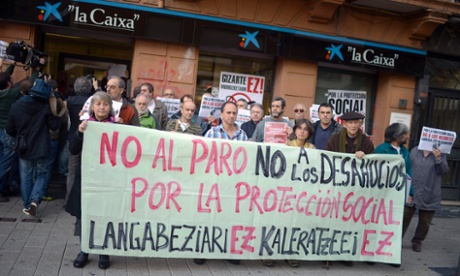 So today I made a major mistake. I left Barcelona. I am aware that I am romanticizing the city, but romanticism has a radical genealogy and is not to be confused with sentimentality. This morning I wandered around the city streets and headed for the site of the CNT headquarters during the Spanish Civil War. It’s now a bookshop, which in properly anarchist fashion, was not open when I visited in contradiction to its posted hours.
So today I made a major mistake. I left Barcelona. I am aware that I am romanticizing the city, but romanticism has a radical genealogy and is not to be confused with sentimentality. This morning I wandered around the city streets and headed for the site of the CNT headquarters during the Spanish Civil War. It’s now a bookshop, which in properly anarchist fashion, was not open when I visited in contradiction to its posted hours.
Barcelona still has the small bars and restaurants that are so enticing to those of us who grew up in dull Northern cities. Paris feels like a museum these days but Barca has the feel of a place that matters. To be involved in the movement in New York has often felt like a marginal activity. In Barcelona, I found my most radical utterances were received as mainstream, not just by activists but by the academics, artists and journalists that I met. Last night one activist said to me that she expected there would be a revolution in Spain within three years. I believed her.
Whether it wins, that’s another matter, but the reasons for the left shift are not hard to find. Today the European Union yet again bailed out the banks with a
payment of €37 billion from the euro zone bailout fund to four Spanish banks on the condition that they lay off thousands of employees and close offices as part of their restructuring.
The chief culprit Bankia will lay off 6000 people, and some of the other banks are merging so there will be over 10,000 redundancies to prop up the banks. Needless to say, the chance of any economic recovery took another backwards step today.
And the mortgage crisis has got so bad that even the austerity dedicated government has decreed a stop to foreclosures, following a rash of foreclosure-induced suicides. Foreclosures were running at an incredible 500 a day, with a backlog of some 350,000 reported. There were at least eight reported suicides by debt in October and early November, causing angry street protests.
At the same time, Spain is feeling the effects of climate change. I was talking to someone from Seville yesterday, who told me that the summer temperature is regularly 48 degrees C/118F. The entire city becomes nocturnal to compensate. Yesterday in Barcelona, there was a tropical downpour that followed months of drought in the summer. Desertification is an issue across the country. While six per cent of fertile land has already become desert, up to a third of the country is considered under threat.
Fires, floods and beach erosion are all serious issues and long-term measurements indicate that there is a visible trend. For example,
Spain has lost 90% of its glaciers in the past century, with the remaining ice expected to disappear completely within a few decades, according to the environment ministry. While the Pyrenees were covered by 3,300 hectares of glacier when records began at the end of the 19th century, now only 390 hectares remain.
So Spain exemplifies the climate/debt conundrum. Austerity is causing the economy to shrink. Debt repayment is still demanded from banks, government and private citizens alike. If the economy were to grow sufficiently to make this possible, the climate disaster could only accelerate.
This is a contradiction so acute that the revolution being openly discussed in Spain might seem like the only sensible solution. Perhaps that accounts for the resilience and optimism of the Barcelona activists, despite all the tensions, splits and hardships that exist. Or perhaps it’s harder to break a great city than the neo-liberals think.

